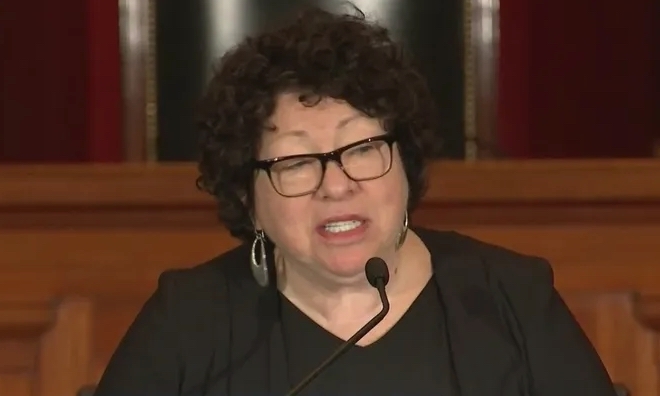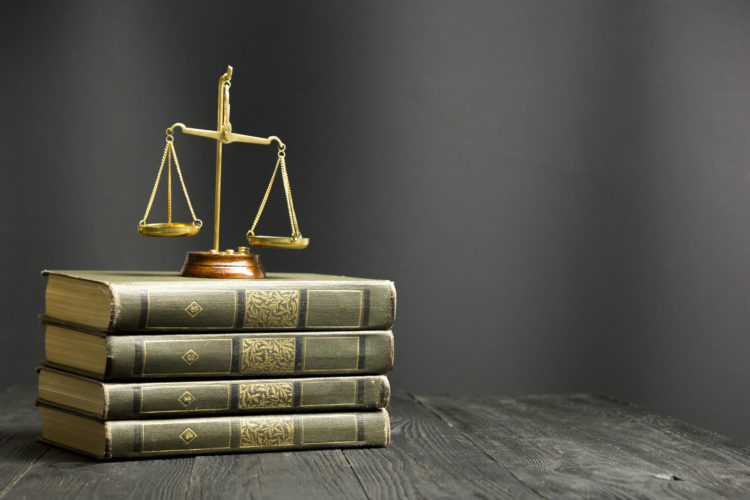There was a time when the American Bar Association (ABA) was respected as a non-partisan, non-political professional organization dedicated to good governance and the rule of law. That was the general view in the 1940s when the ABA began providing its evaluations of judicial candidates to the Senate Judiciary Committee after they had been nominated, and that was still the general view in the 1950s when American presidents began soliciting ABA evaluations of potential judicial candidates prior to nomination.
Sadly, in more recent decades, the ABA has become increasingly political and partisan. Today, it is widely regarded as little more than a left-wing advocacy group. That’s why many lawyers, including me, have stopped being members, and that’s why many presidents, including George W. Bush and Donald Trump, have stopped asking the ABA to evaluate potential judicial candidates prior to nomination. And while the ABA continues to submit its evaluations of judicial candidates to the Senate Judiciary Committee and the committee continues to consider them, recent events suggest that those practices also ought to stop.
On October 29th, the ABA submitted a two-page letter informing the Judiciary Committee that Lawrence VanDyke was “unqualified” to serve on the United States Court of Appeals for the Ninth Circuit. As a partisan attack on a judicial nominee, it wasn’t as crass and ham-fisted as the Democrats’ attack on Brett Kavanaugh, but it was a nasty, unprincipled hit job all the same.
By any objective measure, Mr. VanDyke is clearly well qualified. He graduated magna cum laude from Harvard Law School, and while he was there, he was an editor of the Harvard Law Review, the most prestigious law journal in the country. He clerked for Janice Rogers Brown on the United States Court of Appeals for the District of Columbia Circuit. (I’m one of Judge Brown’s many admirers.) And he went on to serve successively as assistant solicitor general of Texas, as solicitor general of Montana, and as deputy assistant attorney general for the United States Department of Justice.
Why did the ABA rate him as “unqualified”? According to the letter:
Mr. VanDyke’s accomplishments are offset by the assessments of interviewees that Mr. VanDyke is arrogant, lazy, an ideologue, and lacking in knowledge of the day-to-day practice including procedural rules. There was a theme that the nominee lacks humility, has an “entitlement” temperament, does not have an open mind, and does not always have a commitment to being candid and truthful.
Who were these interviewees? The letter doesn’t say. Did they provide the interviewer with specific examples of the alleged faults? The letter is silent on that point, as well. And while the letter concedes that some interviewees expressed “positive” views, it fails to provide any details.
Judging by what Fox News found when it asked several of them about the ABA letter, that appears to have been a serious omission:
“Absolutely outrageous and couldn’t be further from the truth,” is how former Nevada Attorney General Adam Laxalt described the characterizations in the ABA’s letter. … “[H]e is incredibly hardworking” and “absolutely brilliant.” … “People just love the guy.” … During the interview, Laxalt said, “[The ABA interviewer] never brought up anything negative,” and as a result he did not have the opportunity to defend him.
Joseph Tartakovsky, who was the Nevada deputy solicitor general for three years under VanDyke, said, “[I]t was clear to me that [the interviewer] was going through the motions,” as she did not ask follow-up questions. Tartakovsky said he was “surprised and dismayed” when he read the ABA’s letter, as he too gave VanDyke a strong recommendation, saying he was an “exceptional lawyer” who would be good for the job. “I told her that I thought he was born to be a judge.”
Ashley Johnson, who worked with VanDyke for several years at the Dallas office of law firm Gibson Dunn … gave a glowing review. “[T]he entire call seemed very cursory,” and … she figured this was “because Lawrence is so obviously qualified and of the highest integrity.”
Another attorney who has worked with VanDyke, former Utah solicitor general Parker Douglas, found it “a little surprising” that he was not interviewed by the ABA, given his history working alongside VanDyke. “I was surprised by the letter,” Douglas told Fox News. “The guy’s not lazy, I can tell you that,” he added. He recalled having esoteric conversations with VanDyke about appellate procedure, called him a “great appellate practitioner, and said it would be “just nonsense” to say otherwise.
Even assuming that the opinions of the more critical interviewees were harsh enough to outweigh such effusive praise, it seems unfair of the ABA to simply ignore the praise altogether. However, that’s not the worst thing about the letter. That honor goes to what appears on its face to be a damning statement: “Mr. VanDyke would not say affirmatively that he would be fair to any litigant before him, notably members of the LGBTQ community.” While that sounds worrying, as law professor Josh Blackman noted in the Atlantic, it’s actually a deliberate distortion, a nasty piece of sophistry that uses deceptive language to make a standard response to a standard question sound bad:
I have watched many confirmation hearings. Often a nominee is asked whether he or she would be fair to a particular group. The nominee invariably replies, “I will be fair to everyone.” It would be improper for a judge to single out any group for particular treatment.
VanDyke confirmed this interpretation when he was asked about this part of the ABA’s case against him at his confirmation hearing. Holding back tears, he said, “I did not say that. I do not believe that. It is a fundamental belief of mine that all people are created in the image of God, and they should all be treated with dignity and respect.”
The ABA letter elicited an angry response from members of the bar:
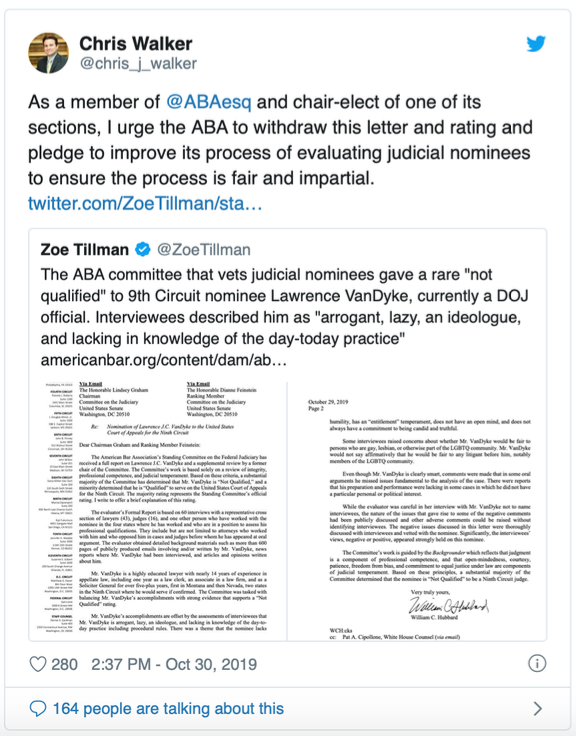
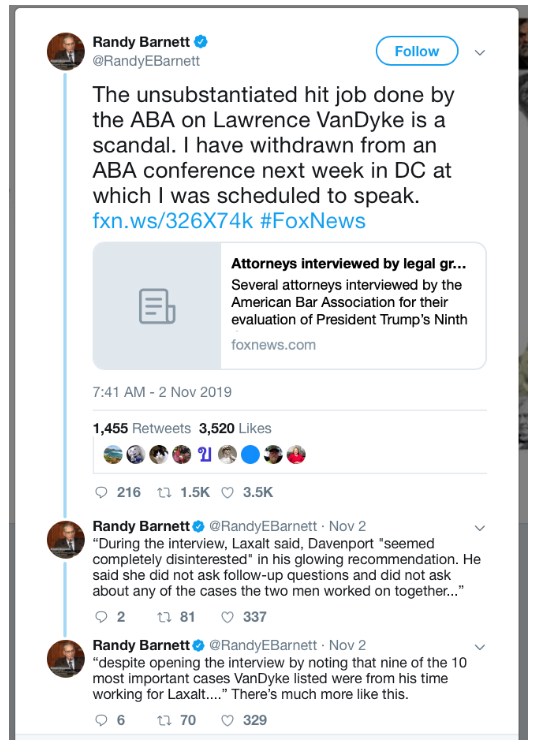
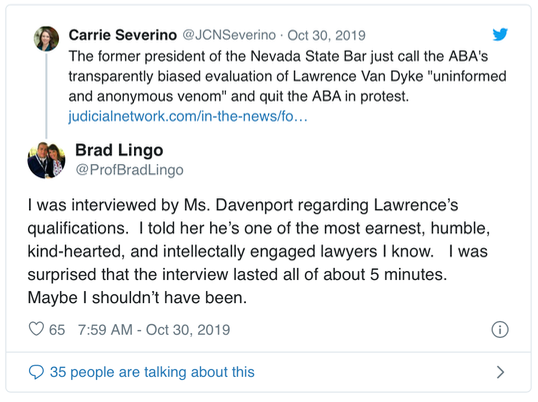
In the Atlantic piece cited above, Josh Blackman cited several ways in which the ABA investigation failed to comply with the ABA’s own procedures, and he urged the Senate to call Maria Davenport, the lawyer who led the ABA’s investigation, to “testify under oath.” And he spoke for lawyers all over the country when he said, “The process was flawed from the outset, and should not be afforded any deference. … Even if Davenport testifies, and justifies her actions, the damage has already been done —not to VanDyke, but to the ABA. This letter demonstrates that the organization can no longer be trusted to perform a fair assessment of nominees.”
